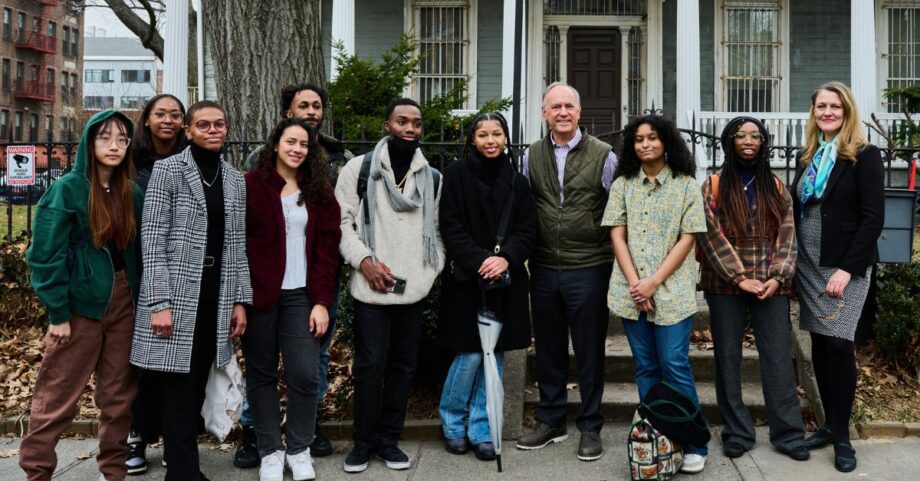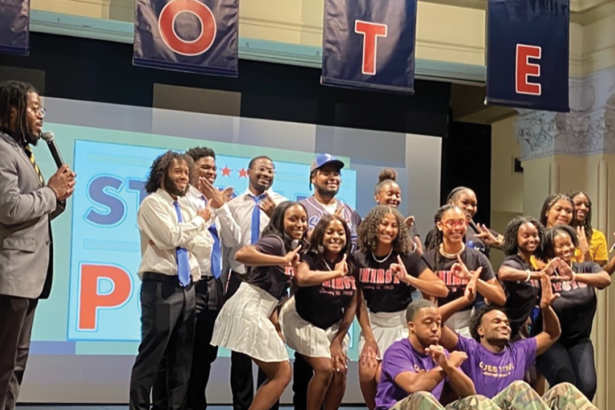The City University of New York has received $5 million from the Mellon Foundation to expand CUNY’s innovative Black, Race and Ethnic Studies Initiative (BRESI), which was created with support from the foundation to drive change across CUNY’s 25 campuses and advance racial and social justice initiatives. The latest grant will allow CUNY to launch New York’s first dedicated graduate degree program in Black, Race, and Ethnic Studies (BRES). CUNY was the largest recipient of 95 grantees awarded more than $18 million by Mellon for race, ethnic, gender and sexuality studies, reflecting the University’s unique commitment to advancing the cause of social justice.
“Affirming Multivocal Humanities is an initiative that champions the insightful scholarship and teaching taking place in these disciplines — those that are too often undervalued and even undermined in American society today,” said Mellon Foundation President Elizabeth Alexander when announcing all 95 grant winners. “We are proud to support colleges and universities in the United States that are advancing deep research and curricular engagement with the stories and histories of our country’s vast diversity and the modes of inquiry that race, gender, and ethnic studies explore and expand.”
“CUNY is grateful to the Andrew W. Mellon Foundation’s continued support for our efforts to reimagine Black, Race, and Ethnic Studies,” said Chancellor Félix V. Matos Rodríguez. “Amid a nationwide effort to undermine the very concept of diversity and inclusion, the new graduate program in Black, Race, and Ethnic Studies (BRES) will provide a much-needed resource to drive social change, open new avenues of opportunity for our students and sustain CUNY’s mission to uplift New York’s most underserved communities.”
New York’s First Dedicated BRES Graduate Degree Program
Over the next five years, the grant will provide $2.3 million to support incoming Ph.D. students and $2.7 million to hire new faculty. This BRES Ph.D. program adopts an innovative “discipline-plus” structure. Prospective students applying to the BRES Ph.D. program, based out of the CUNY Graduate Center, will be required to identify a Humanities or Social Science discipline among existing Ph.D. programs. While fulfilling these traditional curriculum requirements, they will complete a series of multidisciplinary BRES seminars. This unique structure is designed to provide students with an advantage in the academic and non-academic job market, qualifying them for positions in their chosen field while placing them at the cutting edge of scholarship. The Graduate Center will also offer a related Master of Arts degree in BRES.
“In our increasingly diverse nation, there is an urgent need for scholars and thinkers who are experts in Black, Race, and Ethnic Studies,” said Joshua C. Brumberg, interim president of the CUNY Graduate Center. “The Mellon Foundation’s generous, ongoing support positions the CUNY Graduate Center to create multidisciplinary doctoral and master’s programs that draw on the vast intellectual strengths of CUNY faculty and prepare students to lead change in higher education and all aspects of society. These innovative programs expand our long-standing commitment as a public graduate school to advance social justice through pathbreaking research and education.”
A Historic Partnership
The new BRES graduate program is the culmination of efforts that began in 2020 when the Mellon Foundation granted CUNY $10 million to expand initiatives related to the pandemic and racial justice, including $3 million to reimagine its commitment to inclusion and scholarship.
The result was the Black, Race and Ethnic Studies Initiative, led by a 13-member BRESI Council co-chaired by Héctor Cordero-Guzmán, president of the Research Foundation of CUNY and Judith M. Anderson, associate professor of Africana/African American Studies in the Department of Ethnic and Race Studies at the Borough of Manhattan Community College.
To advance the study of race and ethnicity throughout CUNY’s 25 colleges, the council invited faculty and staff to submit funding proposals for courses and research. Out of 500 applications, 126 applicants received upwards of $1.8 million to create more inclusive curricula, increase opportunities for students to engage in research and internships and improve campus climate. Funded projects include:
- Flatbush African Burial Grounds: Brooklyn College students participated in a semester-long, paid internship with the Flatbush African Burial Ground Coalition (FABGC), connecting their studies in anthropology and sociology to the present-day struggle for racial justice in Brooklyn. Last year, the students led Chancellor Matos Rodríguez on a tour of the site.
- Addressing Racial Health Inequity through Student Internship Experiences: A program to educate students on the impact of racial and ethnic inequities on the health of historically underrepresented communities led by Queensborough Community College biological science and geology professor Punita Bhansali.
- Digitizing the Diaspora: Chinatown Mothers’ Pandemic Feminist Organizing through WeChat: Kingsborough Community College’s Lili Shi, professor of communications and performing arts, undertook a digital ethnography to investigate how an online mothers group in Brooklyn’s Sunset Park Chinatown used WeChat, a social media platform from China, to create a diasporic and feminist space for each other during the COVID-19 pandemic.
- Slavery Records Indexing and Analysis Unit: Public management professor Judy-Lynne Peters of John Jay College of Criminal Justice has worked to discover and analyze birth records of enslaved mothers and their babies born following passage of New York’s 1799 Gradual Emancipation Law.
- Careers in Publishing for Students from Underrepresented Backgrounds: Led by English professor Timothy Aubry, the program seeks to diversify publishing by helping Baruch College students launch careers in the publishing industry. The central component is a publishing internship.
Alongside these awards, a grant of $250,000 was allocated to support the BRES Collaboration Hub. Established in the spring of 2023, the Hub serves as a mechanism for convening faculty and doctoral students interested in interdisciplinary, multidisciplinary and transdisciplinary research in BRES across CUNY. In 2024, the Hub was awarded $550,000 in funding from the Chancellor’s Strategic Investment Initiative Fund to establish the BRES Research Seed Grant Program to support faculty research across the University. For academic year 2024-2025, it is expected to support up to 30 projects ranging from $5,000 to $10,000 each.
The Andrew W. Mellon Foundation is the nation’s largest supporter of the arts and humanities. Since 1969, the Foundation has been guided by its core belief that the humanities and arts are essential to human understanding. The Foundation believes that the arts and humanities are where we express our complex humanity, and that everyone deserves the beauty, transcendence, and freedom that can be found there. Through our grants, we seek to build just communities enriched by meaning and empowered by critical thinking, where ideas and imagination can thrive. Learn more at mellon.org.
The City University of New York is the nation’s largest urban public university, a transformative engine of social mobility that is a critical component of the lifeblood of New York City. Founded in 1847 as the nation’s first free public institution of higher education, CUNY today has seven community colleges, 11 senior colleges and seven graduate or professional institutions spread across New York City’s five boroughs, serving more than 225,000 undergraduate and graduate students and awarding 50,000 degrees each year. CUNY’s mix of quality and affordability propels almost six times as many low-income students into the middle class and beyond as all the Ivy League colleges combined. More than 80 percent of the University’s graduates stay in New York, contributing to all aspects of the city’s economic, civic and cultural life and diversifying the city’s workforce in every sector. CUNY’s graduates and faculty have received many prestigious honors, including 13 Nobel Prizes and 26 MacArthur “Genius” Grants. The University’s historic mission continues to this day: provide a first-rate public education to all students, regardless of means or background. To learn more about CUNY, visit https://www.cuny.edu.
###



